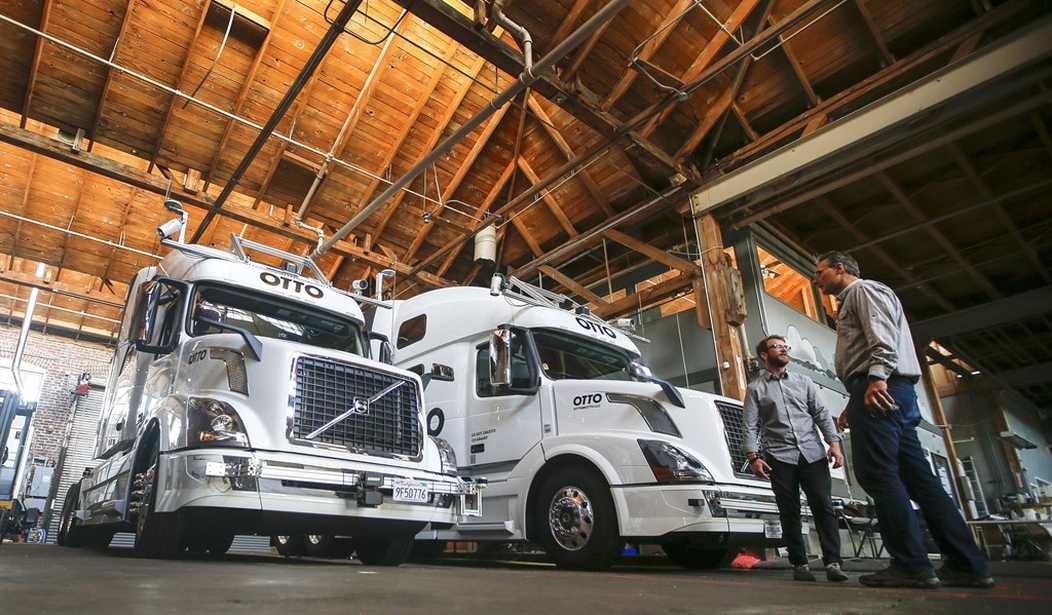California has a tendency to make life more difficult for itself and the rest of the country. Boasting the largest economy in the country and the fifth largest in the world, the decisions made in Sacramento affect everyone from coast to coast and across the globe. This is why the Advanced Clean Fleets (ACF) rule passed last October will be disastrous not just for Californians, but for all American consumers.
The legislation, handed down by unelected bureaucrats of the California Air Resources Board, mandates a complete transition away from internal combustion engines and to electric for medium and large trucks by 2035. It affects any semi-truck from any company with a fleet of at least 50 that drives any distance on California’s roadways; it makes no difference where the headquarters is located. The state is currently awaiting a waiver from the Environmental Protection Agency, which grants the state permission to establish its own emissions standards. A decision could be made in the coming months.
And just like everything else, if California is given its waiver, other states plan to follow.
Environmental NGOs may cheer such legislation, but they are not the ones on the ground running the companies, driving the trucks, or shipping the freight.
Multiple state and/or institutional coalitions are rightly bringing legal action through lawsuits and regulatory comments, declaring the law unconstitutional and running afoul of the Clean Air Act. The California Trucking Association’s suit declares the actions “represent a vast overreach that threatens the security and predictability of the nation’s goods movement industry.”
The Golden State is home to the biggest ports in North America: Los Angeles and Long Beach. Combined, the two handle 17 million TEUs (twenty-foot equivalent units) and nearly $500 billion of cargo each year, coming from and going to different parts of the world. In total, 12 ports dot the California coastline, processing about 40 percent of all U.S. containerized imports and 30 percent of all exports for the U.S.
Recommended
California’s freight system, which needs to move the annual $2.8 trillion worth of everyday household goods they process throughout its borders and across state lines, relies heavily on the 1.8 million trucks on their roads. As of a year ago, less than 300 heavy-duty electric trucks were registered in the state.
The American Trucking Association noted the “unrealistic targets and unachievable timelines” of the rule which will “undoubtedly lead to higher prices.” Current technology and infrastructure are extremely limited and will further complicate any potential transition, adding to the negative repercussions this rule will unleash across the country.
A new diesel truck averages about $150k, goes 2,000 miles on one tank, and needs roughly 15 minutes to refuel. Its electric counterpart can cost two to three times that much, get a mere 150 to 500 miles on one charge, and may require up to three hours to recharge.
California has only a handful of public charging stations for these rigs, with some estimates claiming that 450 will need to be built per week to reach the 157,000 desired by 2030. Not only is this an extremely ambitious and costly endeavor, but extending power to reach new charging stations poses significant challenges as well.
At the same time, California is aggressively pursuing a shift to intermittent renewable power sources like wind and solar. Ironically, six days after mandating all new passenger cars sold in the state be electric by 2035, residents were told to curb electricity usage to avoid potential outages; rolling blackouts were already occurring. To add insult to injury, California has some of the highest electric costs in the nation, with rates skyrocketing in recent years. The state faces an electricity crisis.
Despite what we are told regarding electrifying vehicle fleets, these cars are not emissions-free and impose costs on the environment. The mining processes required for the copious amounts of critical minerals necessary for each battery is energy intensive and destructive to the lands, water systems, and peoples where such extraction occurs.
The two extraordinarily heavy 8,000-lb batteries required for each electric semi-truck add significant weight to the vehicle. Working within weight restrictions, companies will be forced to lighten truck loads, which will result in purchasing more trucks to transport goods and place additional big rigs on highways.
All the extra costs embodied to comply with the ACF – from the vehicles to the electricity to the infrastructure – and the logistics associated with rerouting trucks and excessive charging times, will be borne by the public. Businesses which can actually survive these draconian measures will likely pass some of the extra costs on to the consumer. The taxes levied to subsidize expenses will be paid by the taxpayer. The shortages that will ensue will be endured by all.
We cannot afford ACF.
Kristen Walker is a policy analyst for the American Consumer Institute, a nonprofit education and research organization. For more information about the Institute, visit www.theamericanconsumer.org or follow us on Twitter @ConsumerPal.

























Join the conversation as a VIP Member